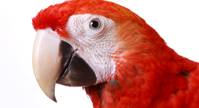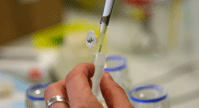Canine Hair Length
Description:
 Some breeds of dogs, such as Labradors, always have a short-haired coat. Some breeds, such as Poodles, always have long hair. Other breeds can have either type of coat, like the Dachshund. This type of long coat is caused by a recessive genetic mutation in the FGF5 gene. The FGF5 gene controls the hair cycle and tells the hair when to stop growing.
Some breeds of dogs, such as Labradors, always have a short-haired coat. Some breeds, such as Poodles, always have long hair. Other breeds can have either type of coat, like the Dachshund. This type of long coat is caused by a recessive genetic mutation in the FGF5 gene. The FGF5 gene controls the hair cycle and tells the hair when to stop growing.
Because it is a recessive mutation, a dog must have two copies of the recessive long-hair allele (l/l) to cause the dog to have long hair. A dog that has short hair could have one or two copies of the short-hair allele (L/L or L/l) to have the short-hair phenotype. Thus, it is possible for two short-haired dogs (if they are both carriers of the long-haired allele, L/l) to have a litter of both long-haired and short-haired pups. If two carriers breed, there is 25% chance per puppy of inheriting the long-haired gene. This may be of a concern for breeds in which long hair does not fit the breed standard.
Hair Length Testing:
Animal Genetics currently offers a test to determine the number of copies of the recessive "long hair" allele a dog carries.
Dogs can be DNA tested at ANY age.
Sample Type:
Animal Genetics accepts buccal swab, blood, and dewclaw samples for testing. Sample collection kits are available and can be ordered at Canine Test Now.
Testing is Relevant For The Following Breeds:
Alaskan Malamutes, Bullmastiff, Chihuahuas, Cardigan Welsh Corgis, Dachshunds, Dalmatians, German Shepherd Dogs, Labrador Retrievers, Mastiffs, Norfolk Terrier, Norwich Terriers, Pembroke Welsh Corgis, Rottweilers, Schipperke, Shiba Inus, Weimaraners
Results:
Animal Genetics offers DNA testing for the recessive "L" allele. The genetic test verifies the presence of the mutation and presents results as one of the following:
| L/L | Short Hair | The dog is negative for the long-hair allele. The dog will have short hair and will always pass on the allele responsible for short hair to any offspring. |
| L/l | Short Hair | Both the dominant and recessive alleles detected. The dog will have short hair and carries the gene responsible for long hair. The dog can pass on a copy of either allele to any offspring. |
| l/l | Long Hair | The dog has two copies of the long-hair allele. The dog will have long hair and will always pass on a copy of the long hair allele to any offspring. |
Submit a Sample for Testing:
To submit a sample for testing please go to Canine Test Now.
To order a sample collection kit please go to Order Sample Collection kits.
Cost per sample is $40.00. Please see our Canine Fee Schedule for all test rates.










